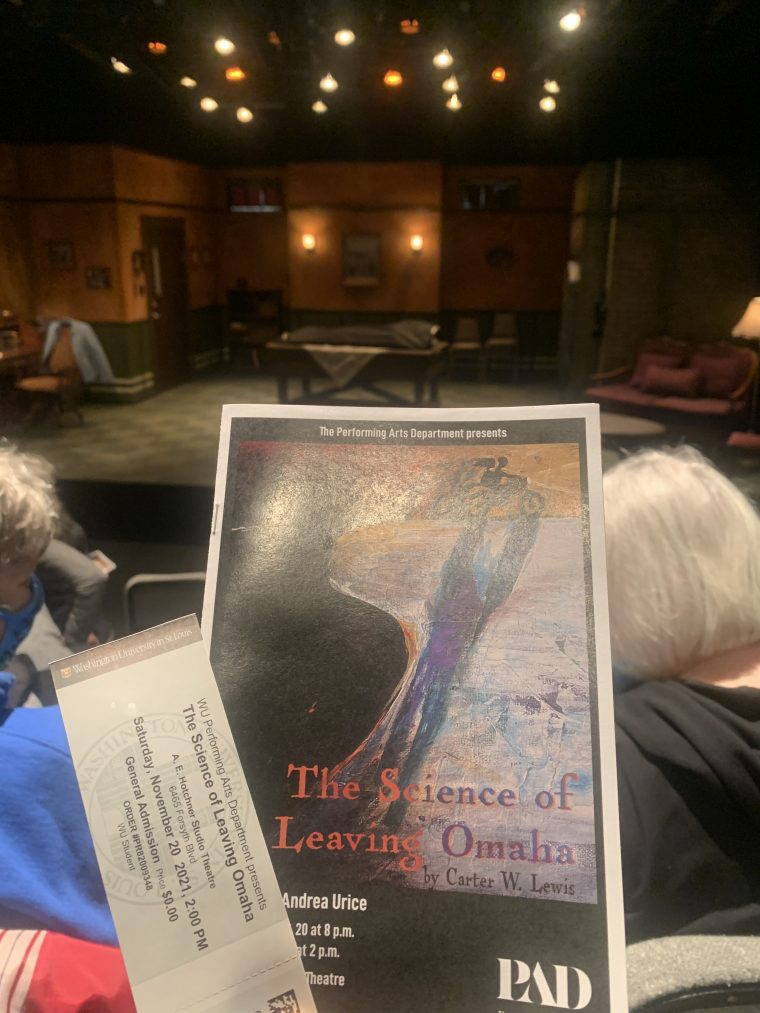Cadenza | Theater
In ‘The Science of Leaving Omaha,’ the cast outshines the script

Carter Lewis, center, with the cast of “The Science of Leaving Omaha.” Photo by Danny Reise | Courtesy of the Source
On November 18, the Performing Arts Department put on “The Science of Leaving Omaha,” an original play written by Senior Playwright-in-Residence Carter Lewis. The three-person show was performed in the A.E. Hotchner Studio Theatre.
The play follows Iris (junior Melia Van Hecke), a young woman who works the overnight shift at a funeral home. The set consists of beautiful orange walls, a cozy section of sentimentals from her boss Mrs. B and, in the middle, a table with a body bag on it. The night of the story, Mrs. B has instructed Iris to work overnight, because they have a body on hand and she believes a body cannot go to “the other side” unless someone is with them. Iris occupies her time by working on a short story about why Omaha is a “suck ass” town that she desperately wants to leave behind.
Iris is incredibly neurotic and a bit child-like, but the night is progressing just like any other night. She spends every shift alone, except for when Sally the security guard (freshman Taylor Miller) comes to check up on her. After some time during this seemingly normal shift for Iris, someone aggressively starts banging on the door. Knowing it’s not Sally, Iris tells the person they can’t be there as the person becomes more and more aggressive. Unprotected, Iris calls Mrs. B to tell her what has happened because that’s all she knows to do. Suddenly, the man (senior Nathaniel Holmes) breaks in through the window, exclaiming that he needs to get into the building because the dead body is actually his sister Ruth Ellen.
The man tells Iris his name is Baker — not Mr. Baker, which Iris automatically calls him even after he crawls through her window — and he constantly asks what’s going to happen to Ruth Ellen so he can know everything about the process. Iris is uncertain, and her uncertainty makes Baker increasingly angry; the more she apologizes for her lack of knowledge, the more he berates her for not knowing. Though neurotic from the beginning, the true extent of Iris’ nervousness becomes clear during this scene, thanks in part to a stellar performance by Van Hecke.
Eventually, Baker reveals that Ruth Ellen is his wife, not his sister, and he only lied so Iris would let him in. They’d only been married for 27 hours, but after getting into trouble at a bar, they ran away, and Ruth Ellen died on the run. Afterwards, Baker and Iris agree to work together to figure out the cremation process, and they have a sweet but strange conversation about the hardships of their lives and their views on love.

The empty stage of “Omaha” before the start of the show. Photo by Jordan Coley | Student Life
Iris reveals her mom was an absent alcoholic, and Baker talks of how he and Ruth Ellen were both estranged from their families. With Van Hecke’s beautiful acting, Iris opens up about her fears of never being loved and never leaving Omaha.
Afterwards, the plot of the play gets a bit convoluted and falls apart once it has to pick a concrete direction. Baker and Iris suddenly, and shockingly, decide to run away together, but right before they can leave, Sally the security guard comes to check on Iris and senses that she’s not alone. To shorten a long and narratively illogical story, Sally and Baker fight about whether or not Baker should go into police custody for breaking in. Iris’ most courageous and outspoken moment of the show is when she defends Baker from her friend. In what is perhaps the most confusing part of the show, Baker suddenly sprints out of the building and is subsequently shot and murdered by the police. Sally follows him out, gunshots go off in the distance, and Iris falls to the floor in tears.
From the moment Holmes stands onstage as Baker, he is captivating, and I found myself rooting for him despite his lack of character depth because of Holmes’ superior acting. Van Hecke also captivated the audience the entire show, giving a nuanced portrayal of a deeply anxious and afraid young woman.
The actors’ performances made up for the fact that the script itself was lackluster in multiple ways. In addition to the improbability of the story line, a one-off line about eating disorders felt unnecessary and, quite frankly, insensitively disrespectful. While Iris spends a lot of time on the phone with Mrs. B, audiences never see or hear the character, which makes it clear that she is purely a plot device. Iris makes jokes that sound like they came from an old man, and the Sally character feels out of place in the show, like a failed attempt at comedic relief. The cast of “The Science of Leaving Omaha” is truly stunning, but the show itself lacks similar merit.
